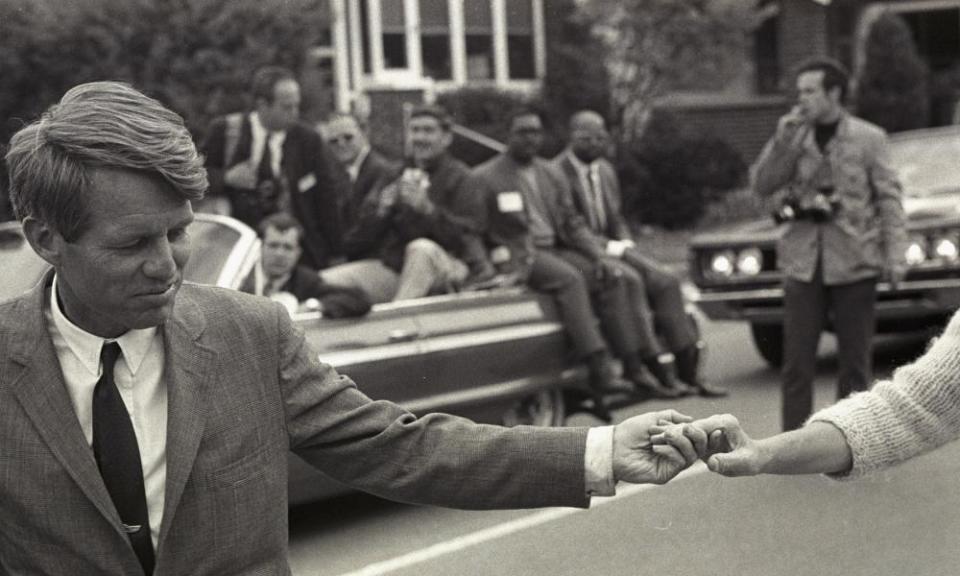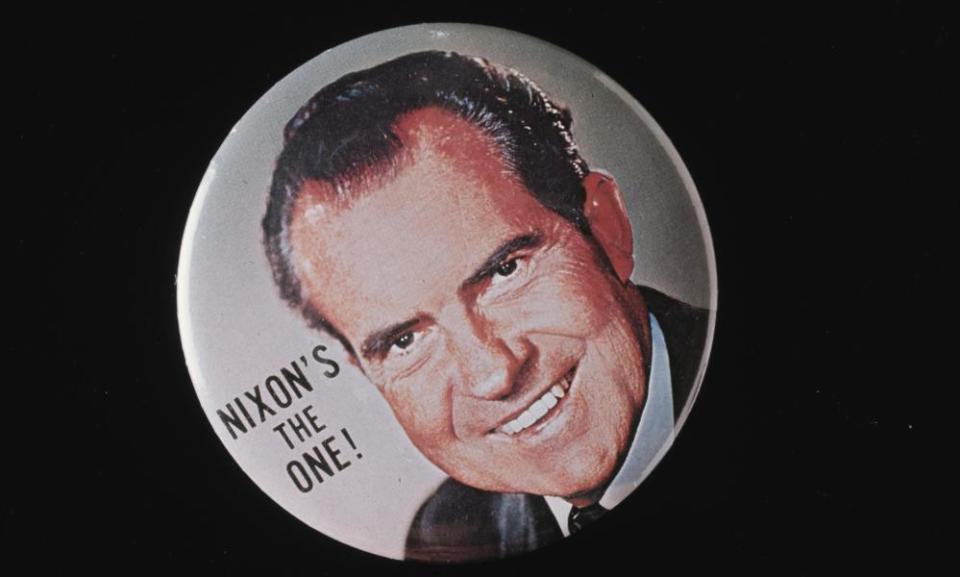Playing with Fire and Bobby Kennedy: a Raging Spirit reviews – 1968 looms large
MSNBC hosts Lawrence O’Donnell and Chris Matthews have written books about politics 50 years ago. Why is 1968 and all that so important to liberals?

A television actor courting the far right. A “law and order” candidate railing about race and crime. An eccentric, one-cause liberal cheered on by students who balk at the establishment’s colorless pick. Two arch manipulators, each intent to win at all costs – with one even arranging contacts with a foreign nation to his own ends.
If the conceit sounds like HBO’s version of the 2016 election, that seems to be what the MSNBC host Lawrence O’Donnell has in mind with Playing With Fire, his new book about the 1968 race. Ronald Reagan is the actor, billed as “the Donald Trump of the 1960s”; George Wallace the demagogue whose voters “sounded like Trump voters in 2016”; Eugene McCarthy the ideologue, with echoes of Bernie Sanders; Hubert Humphrey the party’s choice, a nod to Hillary Clinton; Lyndon Johnson and Richard Nixon are the puppetmasters, wheeling and dealing to the end.
O’Donnell, a former Senate staffer and writer on The West Wing, has written a breathless account of 1968 that, like that TV show, recalls endless backroom soap operas. There are 40 pages dedicated to delegate hunting at the Republican national convention in Miami Beach and scores more on campaign plots, rivalries, truces and betrayals. Dozens of advisers flit by, with names like Tom Turnipseed and Curtis Gans, and at times the book reads like a reel of baby boomer cameos. Roger Ailes and Alan Greenspan are there at Nixon’s side, Mitt Romney’s dad drops by, and Ted Kennedy and Bill Clinton mill around the Senate, trying to look useful.
Though a few moments are written with suspense, like Robert Kennedy’s assassination, O’Donnell rarely strays into the pulp of books by other cable pundits. (In Killing Kennedy, Bill O’Reilly considers his protagonist, lost in the Pacific and threatened by barracudas: “Without pants, he is surely an inviting target.”) Instead, O’Donnell’s style ranges from conversational to dry to staccato bursts: “The Bobby announcement seemed to energize Johnson. Maybe it was adrenaline. Maybe hatred. Maybe both.”
The book should appeal to fans of other political play-by-plays, like Game Change, and readers with progressive politics, though O’Donnell tempers his admiration for McCarthy and RFK with a charting of their flaws. McCarthy could be arrogant and mercurial; Kennedy dithered and oversaw debacles such as wiretapping Martin Luther King Jr and the Bay of Pigs.
Scattered throughout the book are reflections on ripples in 1968 that caused waves decades later, like the growing power of live TV or “dirty tricks” by campaign staffers. O’Donnell spends a chapter on Nixon’s contacts with the South Vietnamese government – he undermined peace talks for political gain – and hints at the alleged contacts between Trump’s campaign and representatives of the Russian government. Johnson accused Nixon’s associates of “treason” and O’Donnell calls it a “perfect crime”, violating the 1799 Logan Act. He does not note that no one has ever been convicted under the law.
O’Donnell runs into most trouble when his pop history slips into cable hyperbole. He calls a Kennedy speech “the most moving moment ever seen on an American political stage” – Lincoln’s funeral tour and VE Day could compete – and writes three times the pundit koan that “the establishment is always the last to know it is wrong”.
In perhaps his boldest claim, he declares “the peace movement won. The peace movement drove US forces out of Vietnam, not the North Vietnamese army.” In their 17-hour epic on the war, Ken Burns and Lynn Novick do not find such a neat resolution. In his 2003 book on the protests, neither does journalist Mark Kurlansky. In just over 400 pages on a US election, O’Donnell does no better.
Which is not to say the peace movement didn’t win over most of the baby boomers, who have written hundreds of books on the decade they came of age. O’Donnell’s MSNBC colleague, Chris Matthews, joined in last month with his own new book, Bobby Kennedy: A Raging Spirit.

This is light hagiography, but well researched and open about its bias: a breezy bio, heavy on Irish Catholic identity. Matthews acknowledges Kennedy’s role in FBI and CIA fiascos and his part on Joseph McCarthy’s anti-communist team, but only in a cursory way. In Matthews’ telling, Kennedy slowly turned against McCarthy, who was his father’s friend; his choices on Cuba are cast in terms of honest error and regret; and “he came to believe he had no choice but to have a wiretap put on King”.
The anchor does recover several footnotes from history, his own and the nation’s. In 1953, he recalls, a nun asked his class to pray over Stalin’s death: “I remember wondering at the time what the intention was.” In 1967, producers put on a debate between RFK and Reagan. The latter, a new kind of political celebrity, “proved the clear victor in the opinion of both sides”.
Like O’Donnell, Matthews dwells mostly on politics; unlike O’Donnell, he tries to give his characters depth. Kennedy’s father was an arch-conservative tycoon who wanted to appease the Nazis, so oedipal shadows abound. Melancholy fills the second half, after Kennedy’s two older brothers are killed and RFK struggles to find his own path. Matthews does not try to pierce Kennedy’s private grief. Instead he describes his change from a hard-nosed, moralistic enforcer to an ambivalent, more thoughtful leader. If ambition drove Kennedy, Matthews is willing to overlook it.
By the end of the book, Matthews sets RFK up as a model for today’s Democrats, and suggests they pursue the coalition of minority voters, young people and white workers that he hoped to build – not unlike the bloc that elected Barack Obama in 2008 and 2012.
But RFK’s coalition, if it existed in 1968, was changing with its times, just as Obama’s did decades later. Many boomers turned to cynicism in the 70s and materialism in the 80s, making careers in the same industries – finance, politics, media – they had earlier scorned. Republicans held the White House for 20 of 24 years after 1968, and cable TV and the internet helped exacerbate partisanship for 20 years after that. More boomers voted for Trump than Clinton.
By late 2016, when young people overtook boomers as the largest generation, the US had gone 15 years into America’s longest war and was sending troops back to Iraq. The antiwar movement of the early 2000s, never mind the 1960s, had faded to nostalgia. If there were flickers of 2016 in 1968, as O’Donnell suggests, it was the boomers who turned them into the reality TV show now playing 24/7. If there is a successor to RFK out there, as Matthews hopes, it will take a new coalition of voters to elect her.

